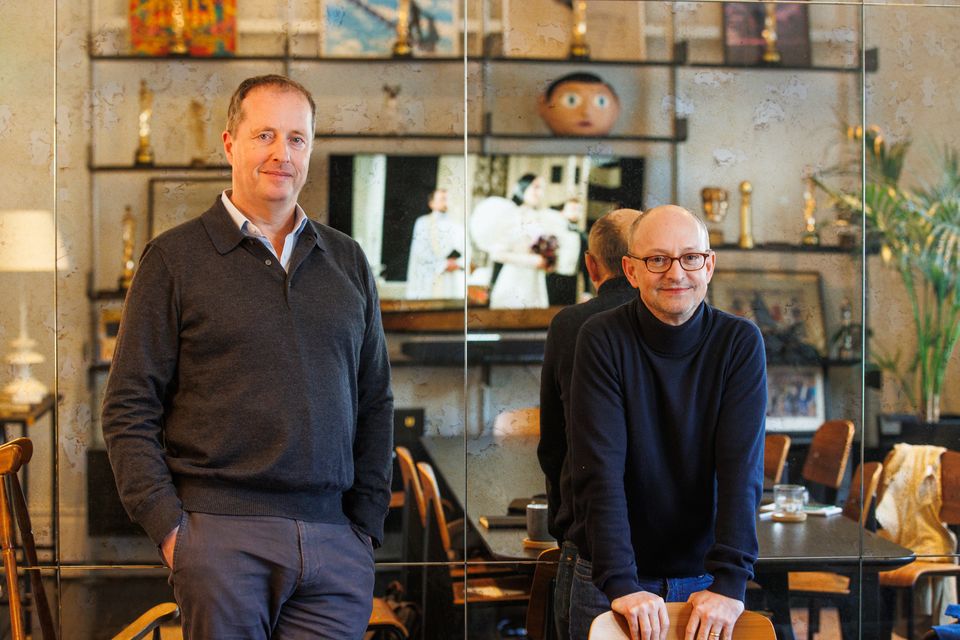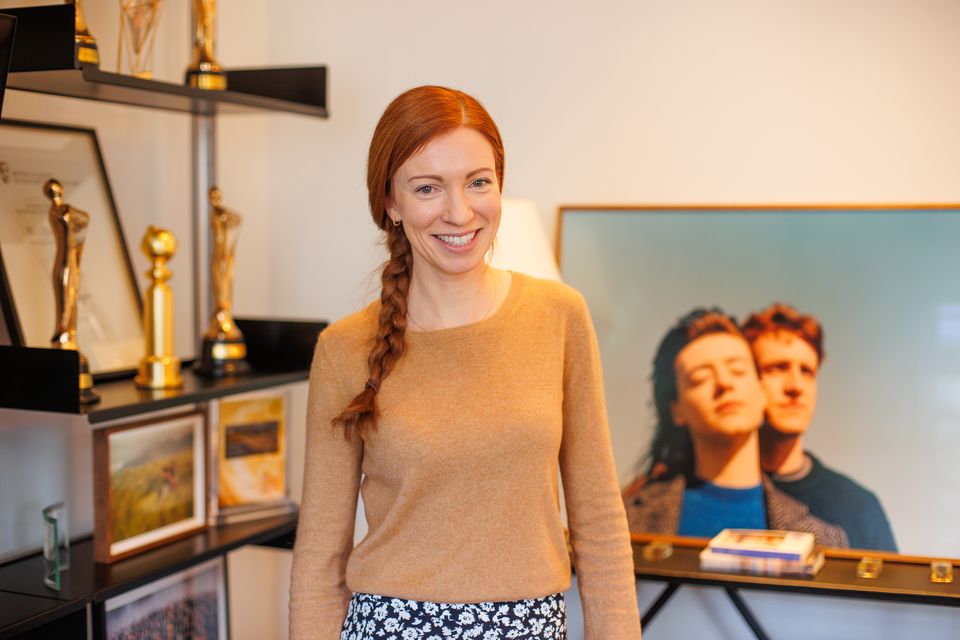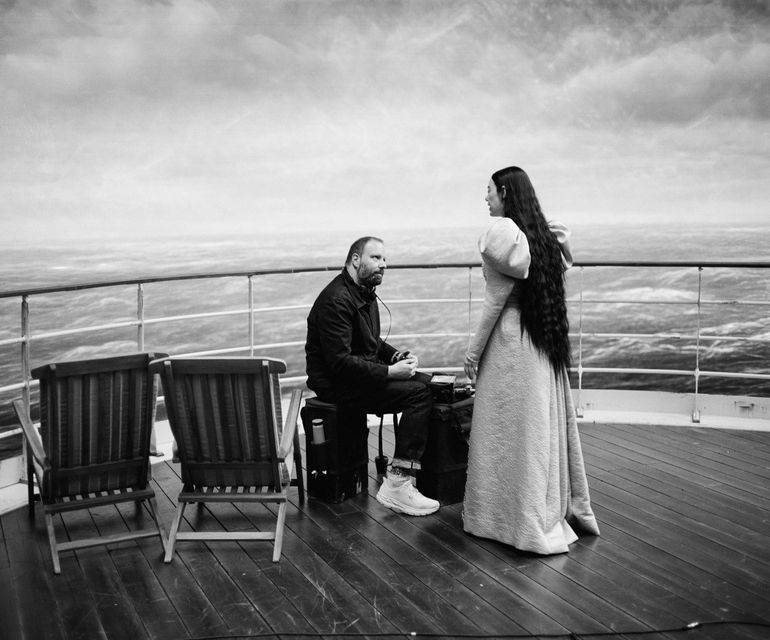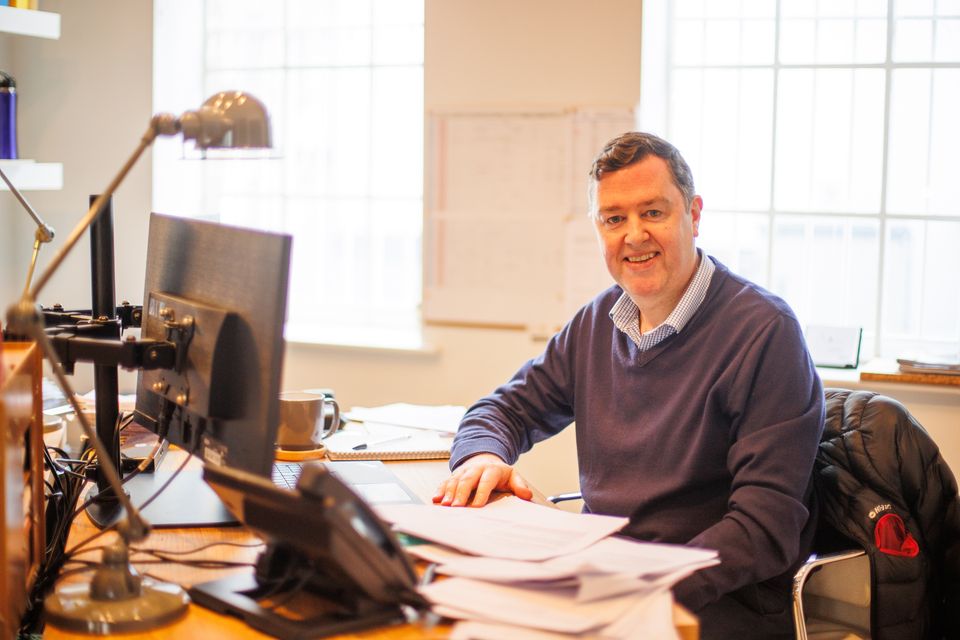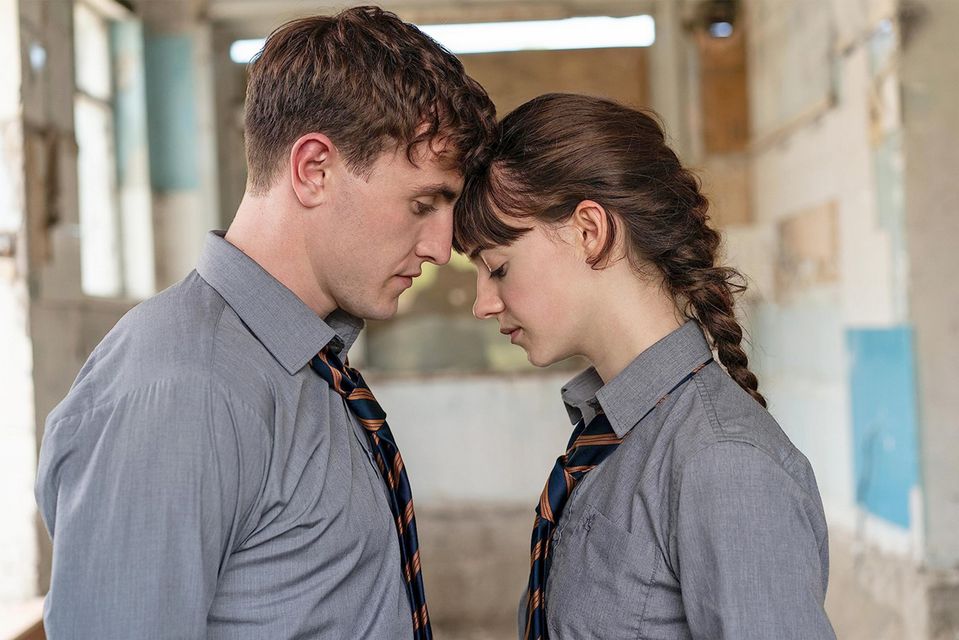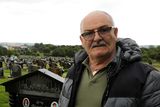Meet the Irish makers of Poor Things: ‘The Oscars are an out-of-body experience’
Tanya Sweeney meets the team a the Irish company behind hits including Normal People and Poor Things – the film with the second-highest number of nominations at tomorrow’s awards
Tanya Sweeney interviewing Ed Guiney and Andrew Lowe of Element Pictures
The path to the Oscars red carpet begins behind a nondescript door on Dublin’s O’Connell Street. It’s in these offices that Normal People and Poor Things, to name just two, were ushered from script to on-screen success. The latter — the latest jewel in Element Pictures’ crown — is up for the Best Picture Academy Award this Sunday. I meet the co-CEOs and founders Ed Guiney and Andrew Lowe and their team there as they prepare to fly out to Los Angeles.
To an outsider, the 9am production meeting feels like cinematic magic taking place. For the 40-odd staff here at one of the most successful production companies in Europe, it’s just another morning in the office.
Guiney and Lowe are joined by various producers and, via Zoom, the London team. They run through about a dozen titles in production and pre-production. There are also about 40 projects in development.
‘You can get involved in very expensive bidding wars for material’: Andrew Lowe and Ed Guiney at Element Pictures. Photo: Mark Condren
Some deeply exciting names of actors, authors and directors are casually thrown around, but the glamour ends there. While Guiney has already held a meeting across town, the vibe is decidedly relaxed and collaborative. There’s much talk of signing contracts, chasing agents, finding crew, meeting deadlines for competitions, festivals, the comings and goings of studio personnel, location scouting, music licensing, budgets — the spirit-crushing minutiae of film production. With all these myriad moving parts, it’s a miracle that any film or TV production gets over the line.
But they do, often to considerable fanfare. Element Pictures has just celebrated its 100th project: series two of The Dry, a dramedy series to be broadcast on RTÉ and ITVX this year. Their various projects, including Adam & Paul and The Guard, have netted countless award nominations. It was at this very boardroom table, surrounded by production posters, props and awards, that someone mentioned Alasdair Gray’s novel Poor Things.
“It was just one day at one of these meetings someone said, ‘What about this book?’, and then five or six years later…” says Mark Byrne, Element’s group head of business affairs.
‘There’s never any negativity or pressure’: Paula Heffernan of Element Pictures. Photo: Mark Condren
The resulting film, starring Emma Stone and directed by long-time Element collaborator Yorgos Lanthimos, is the most Oscar-nominated Irish production to date, as well as the movie with the second highest number of nominations this year, behind Oppenheimer.
Bringing new projects to fruition can be protracted and laborious, but this week is an exciting one for the Element team: as well as this Sunday’s ceremony, Poor Things has passed the $100m mark at the box office. Adding to the excitement is the fact that for many of the film’s nominees, among them composer Jerskin Fendrix and production designer Shona Heath, this is their first film.
On touching down in LA this week, days after we meet, Guiney and Lowe’s first port of call was a dinner for the other producers of the Best Picture nominated films.
“It’s quite a big time commitment — there are a lot of events in the run-up to the Oscars,” says Lowe. “The voting closed yesterday, so it’s done now. There were an awful lot of screenings and Q&As trying to get in front of voters. But it’s all great fun. I think there’s a general sense that everyone wants to be the one but most of us know that we’re not going to win, so there’s a good kind of esprit de corps among everybody.”
Element’s first big Oscars year was 2015: Lanthimos’ The Lobster earned a Best Original Screenplay nomination, while Lenny Abrahamson’s Room was up for Best Adapted Screenplay, Best Picture and Best Achievement in Directing, with Brie Larson winning Best Actress as the film’s lead.
For some staffers, including head of production Paula Heffernan, this year marks their first time at the Oscars.
“The job can be hard, and there’s a hard slog. There are days when you’re just at your computer bashing away and you look up from your emails and go, ‘the glamour’,” she says. “The plan is to absorb all this [excitement], and it will actually keep me going through the hard days.”
Byrne describes attending the Oscars as “a slightly out-of-body experience”.
Director Yorgos Lanthimos with Emma Stone on the set of Poor Things. Photo: Atsushi Nishijima
“For me, that was the absolute dream as a kid,” he says. He recalls attending the awards in 2019, when Element’s The Favourite was nominated in 10 categories. “The Cartoon Saloon [team, also nominated that year] were also there, and their tip was, ‘Take your time on the red carpet when you go in. Remember to soak it all in’.”
This appears to be the kernel of Element’s success; Lowe and Guiney have surrounded themselves with people who are genuine cinema lovers.
“You can tell that there are quite a lot of strong-minded people here,” Guiney says. “Chelsea [Morgan, development executive] comes across something and says, ‘I really want to do it’, even if it’s something that I’m a bit [lukewarm] on. People’s individual passions punch through.”
Staff turnover is low: Byrne has been here for 12 years; Heffernan, a former TV production manager who worked her way up from being Guiney and Lowe’s PA, for 16. She has watched the company grow from humble beginnings.
“The attitude that Ed and Andrew have is so ambitious,” she says. “There were times, after Covid, when productions went back up, we were shooting seven things at the same time. But we get it done and they get released. Even if there’s something that you’re struggling with or it’s challenging, there’s never any negativity or pressure.”
Also central to Element’s success is repeat collaborations with what Byrne describes as “film-makers and writers we are interested in working with”: Abrahamson, Lanthimos, Mark O’Halloran, Emma Donoghue, Sally Rooney, Emma Stone and Tony McNamara are some of the names that appear on multiple productions.
Mark Byrne: ‘The Oscars were a slightly out-of-body experience’. Photo: Mark Condren
To date, Element and Lanthimos have worked on five features. A sixth, Kinds of Kindness, starring Emma Stone, Willem Dafoe and Joe Alwyn, has just been completed. Another untitled project, again with Stone in the lead, has entered pre-production.
Is there a common strand in the projects that Element takes on?
“The first and most important are the talent we work with,” says Lowe. “We all have personal taste and we’re drawn to material that’s interesting and challenging — arthouse, or smarthouse, whatever you call it, but it’s not that we’re sitting here in our ivory castle.”
Element’s book adaptation arm is particularly strong. Several of the company’s noted successes — Room, The Wonder, Normal People, Conversations With Friends — began life as novels.
“That’s one of the benefits of award successes,” says Lowe. “We are on that list of maybe 10, 20 companies between Los Angeles, London and here who would be offered material before it’s offered to the marketplace.”
Guiney adds: “The books thing can be very competitive, and you can get involved in very expensive bidding wars for material. You have to check yourself — when you hear that Netflix and Apple want it, it kind of engenders a competitive dynamic. Sometimes you come out the other side going, ‘s***, we have to do something now with this very expensive [project]’. But a lot of the heavy lifting has been done by the novel to begin with. There’s the character, the story, there’s the tone, the plot.”
Lowe and Guiney are clearly dyed-in-the-wool movie fans. “My friend had one of the first VHS players in Ireland, and we’d go to Metropolis [on Upper Baggot Street] and rent four or five videos,” Guiney recalls, brightening at the memory. “Very early on, as a teenager, I had a sense that I wanted to be a producer because I’d read lots of books about the old studio guys who came from Eastern Europe to California in the early 1900s.”
At Trinity College Dublin, Guiney became friends with fellow film nut Lenny Abrahamson, and they helped set up the Trinity Video Company, a student film-making club.
Lowe was also an arts student, but spent more time off-campus.
“I was not a very hard-working arts student at Trinity and ended up spending a lot of time at the Light House,” he recalls, referring to the arthouse cinema that was at the time on Middle Abbey Street.
Awards: A Golden Globe for Poor Things and a Bafta for The Favourite. Photo: Mark Condren
Inspiration for his own involvement in movie-making came from a less predicable source.
“Albert Reynolds commissioned the Coopers & Lybrand industry report, outlining what we could do in Ireland to get the film industry going. I had a friend working in Coopers who knocked off a copy for me and I devoured that report. It had an idiot’s guide at the back — this is pre-internet days — and that really got me interested.”
Guiney was soon working in the industry. “I remember distinctly the 1990 Oscars and going out to watch them at Ardmore studios because there was no Sky [TV] or anything, and they had it on in the bar,” he says. “We stayed up all night watching it and there was huge excitement. I was making documentaries at the time, and I think seeing that sort of success, you know, that it was possible for an Irish person to actually achieve that, was amazing. With My Left Foot, a lot of my friends were working on it. It didn’t feel like it was something way over there. Jim [Sheridan] and Neil [Jordan] were the pioneers.”
Lowe, meanwhile, had trained as a chartered accountant.
“I’d known Ed as kids and he was already an established producer, so we connected briefly and that got me into production accountancy,” he says. “We then started a conversation about pooling our resources and trying to build a company.”
The pair worked on the 1998 Stephen Bradley film Sweety Barrett. Element Pictures was born in 2001.
It’s easy to recall the commercial breakthroughs of its 23-year history, but it wasn’t always so.
Read more
“We launched in the summer of 2001 and I got married in the September, and my wife keeps reminding me that on our honeymoon, eventually, we had to get her to use credit cards to get us out of the hotel,” Lowe says. “It was very ‘fly by the seat of our pants’ time. We had to really chase down everything and do anything we could to just try and keep the lights on and pay the bills. The first few years were extremely tight.”
With Adam & Paul (2004), Omagh (2004) and The Guard (2011), Element moved into bigger leagues. The latter, starring Brendan Gleeson, becoming their first big break in the US. “We made some money for the first time and it meant we didn’t go bust,” says Guiney.
Element opened their distribution arm, Volta, in 2007, and got involved in the ownership of the Light House cinema, by then in Smithfield, in 2012. Four years later, they acquired the Pálas cinema in Galway. More recently, they launched the screenwriting festival Storyhouse, proving their commitment to nurturing writing talent.
How do they think Hollywood sees their company? “I think they see us as one of the actually-not-many companies outside the US that they would trust,” Guiney says. “The thing about the films that have had Best Picture nominations, the place where that matters the most is LA. We now have the trust of the big studios but also, crucially, the agencies.”
Have these high-profile successes made getting projects completed any easier?
“I mean, it definitely helps in the sense of talent relationships and getting access to material, although it brings a different set of challenges,” Lowe says. “We’re making larger films, but this year we’re making three first-time director films. They’ve become harder because the market is much tougher. Some success might have helped those projects a little bit, but it’s still challenging.”
“Success can actually have the opposite effect,” Heffernan adds. “There’s an assumption that, ‘Oh that’s the Poor Things producers, they have endless amounts of cash’, but our business model is developing new talent as well. At the same time as doing Poor Things, we are doing multiple first-time productions. The money comes from financiers willing to put up a certain amount, considering the risk involved with working with a first-time feature director.”
Element don’t chase the market, but do consider it important to be agile in the face of changing distribution models and audience appetites.
“We have moved on from a time where, say three or four years ago, during the streaming war, it was all about making things and ‘eyeballs’,” Lowe says. “They were spending loads and taking a lot of risks. So, something we could have gotten away with [making] three of four years ago, might be very hard to get away with now.”
Last year, and the Barbenheimer summer in particular, did see an uptick in cinemas’ fortunes. Guiney pulls out a photo on his phone from the Light House cinema, with makeshift ‘sold out’ signs for every screen. “If you look at last year with movies, where you have an exceptional year,” he says, adding that big hits such as Oppenheimer and Poor Things were not based on IP — existing intellectual property, as is common in big-budget franchises.
Paul Mescal and Daisy Edgar-Jones and in Normal People
“We’re very optimistic about the future in cinema,” he adds, “where you find bigger swings, more original material and kind of fresher stuff.”
Normal People, the 2020 drama series that was broadcast originally on BBC Three before being quickly ‘promoted’ to BBC One (“they had to push the news one night”), is another watershed moment.
“That was something that really resonated with a global audience,” recalls Lowe.
“Not that we knew that it would, actually,” interjects Guiney.
“That’s right,” Lowe agrees. “You don’t know, and you don’t try and second-guess. You just focus on the material and work with the talent and make the best version of something.”
Guiney was based partly in Kerry for lockdown when Normal People took off. “There are projects that, maybe when you’re on your deathbed, you’ll think, ‘Which were really just brilliant experiences?’ — that would be one. Probably Poor Things is another one, and Room, The Favourite — these are big films, but not everything we do has that kind of impact.”
Even though Guiney and Lowe are more than used to working the levers behind the scenes, their enthusiasm for cinema remains undimmed.
“When you’re at the Baftas and they go through the other movies and you’re like, ‘Zone [of Interest] is an incredible film, The Holdovers is an incredible film’, it’s a great feeling,” Guiney says. “And the best bit is that you can get to meet the directors and talk to them. And ask them all the questions.”
This article was amended to state that Alasdair Gray was the author of Poor Things, which Tony McNamara adapted for the screen on 9 March 2024 at 6pm.
Join the Irish Independent WhatsApp channel
Stay up to date with all the latest news
